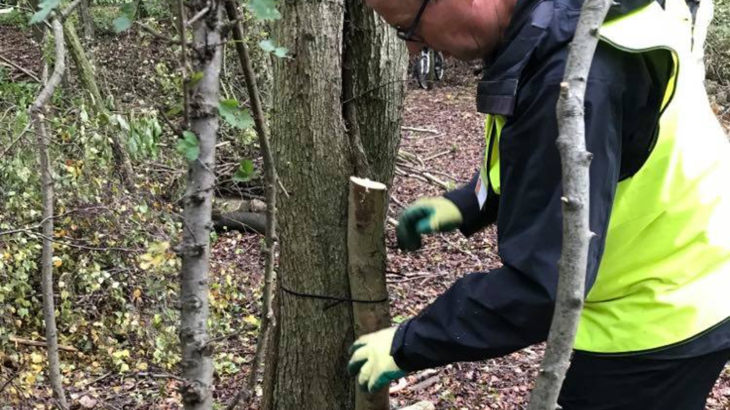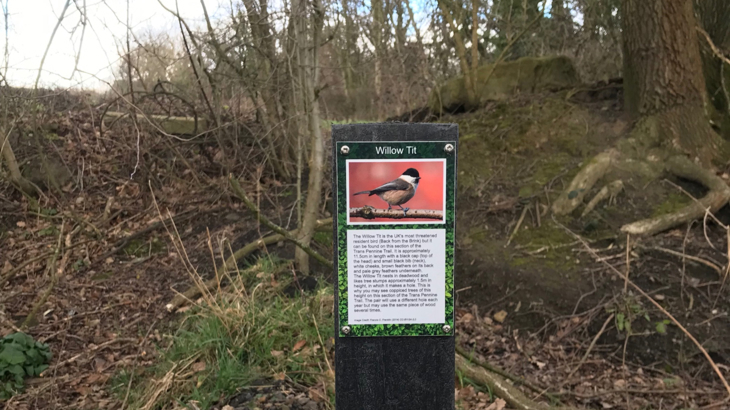In celebration of Earth Day, we talked with Sarah Bradbury, Senior Project Officer, about how she's working with volunteers to protect rare species of wildlife on the Trans Pennine Trail. In this blog, Sarah tells us about the Willow Tits and Dingy Skippers that call the National Cycle Network home.

'Willow Tit' by F.C. Franklin is marked with CC BY-SA 2.0. To view the terms, visit https://creativecommons.org/licenses/by-sa/2.0
In the face of a national climate and ecological emergency, traffic-free paths of the National Cycle Network (the Network) have the power to improve biodiversity and protect wildlife.
As custodians of the Network, it’s our responsibility to ensure that greenways contribute to improving national biodiversity.
As well as being custodians, we are landowners and developers, so it’s within our gift to make a positive difference to the natural world.
Read more about our commitment to making space for nature.
Improving the Trans Pennine Trail for Willow Tits
Sarah Bradbury, Senior Project Officer, has been working with Trans Pennine Trail volunteers to create a new habitat for Willow Tits.
Willow Tits are a rare species of bird in the UK, with a population decline of 94% since 1970 (Barnsley Biodiversity Trust).
Willow Tits' UK conservation status is red.
This means Willow Tits require us to act urgently and effectively to ensure their survival.
Fortunately, Willow Tits have been spotted on the Trans Pennine Trail in Worsbrough, Barnsley.
Sarah tells us more:
“We are so delighted to have the opportunity to support the conservation of Willow Tits here on the Trans Pennine Trail.
“It's great to think that these endangered birds are attracted to the National Cycle Network as a safe place to live.
“We need to make sure that the environment of the Trans Pennine Trail is the very best it can be to support them to thrive.
“These fussy birds like to nest in tree stumps which are around 1.5m high.
“They make holes with their bills in which they build nests.
“With the support of Trans Pennine Trail volunteers, we set about establishing multiple potential nesting sites for Willow Tits.
“Some trees were suitable for coppicing at the Willow Tit's preferred height.
“Where this wasn't possible, we took logs of around 1-2m in length and 8-20cm in diameter and strapped them to the taller, living trees.
“We're extremely hopeful that the Willow Tits will snap up this prime real estate and have successful breeding seasons.
“Do look out for these unusual wooden structures beside the greenway, but please do not approach them.
“We must all be careful to ensure that any nesting Willow Tits do not feel threatened or frightened by our presence.”

Trans Pennine Trail volunteer, Roger, creates a potential nesting site for an endangered Willow Tit.
Improving the Trans Pennine Trail for Dingy Skippers
Sarah and the Trans Pennine Volunteers have also been helping Dingy Skippers, a small butterfly that is often mistaken for a moth.
Among the environments which Dingy Skippers favour are post-industrial sites like former railway lines.
The Trans Pennine Trail has many such stretches, and these butterflies can be found at Worsbrough, Barnsley.
Dingy Skippers are rare and considered a high priority species by Butterfly Conservation.
Sarah takes up the story:
“To support Dingy Skippers, we planted their favourite food, a small yellow wildflower called bird's-foot-trefoil.
“We also created a new wildflower area beside the path, to support a wide range of pollinators.
“Here we've planted wildflower species such as small scabious, cowslip, red campion, white campion and common mallow.
“The Trans Pennine Trail is a vital haven for wildlife, as well as people.
“With the help of volunteers, we’re working hard to enhance the path for all species, and particularly the rarest.
“The volunteers have really enjoyed the ecology task days, knowing that they’re making a meaningful difference to local wildlife.”
To find out more about volunteering on the Trans Pennine Trail in Barnsley, send us an email.

'Dingy Skipper' by Chaz Jackson is marked with CC BY 2.0. To view the terms, visit https://creativecommons.org/licenses/by/2.0
Connecting communities to nature
Sarah went on to tell us that she has worked with Barnsley Council to install a wildlife trail on the Trans Pennine Trail, between Worsbrough and Silkstone Common.
“The trail has a series of posts with information about the different species of flora and fauna which can be found along the greenway.
“Each post is topped with a three dimensional image of the featured species and people can take rubbings of these plaques.
“It's a lovely exercise to travel the trail, spot the posts and collect these images.
“I run local wildlife walks which are suitable for families and local community groups.
“The walks enable the community to experience the trail and learn about the wildlife which live there.
“Connecting with nature is a gift to our physical and mental health.
“The greenways of the National Cycle Network offer so many of us this important connection.
“I feel we have a strong duty to repay our gratitude to nature by ensuring that the many species of wildlife who call the greenways home are supported to thrive.”

A wildlife trail between Worsbrough and Silkstone Common introduces people to the local species who call the greenway home.
Be inspired by Earth Day
Earth Day is a global annual event on 22 April to demonstrate support for environmental protection.
Earth Day (along with every day) is a great time to learn about our responsibility to protect and conserve the natural world.
If all this talk of Willow Tits and Dingy Skippers has got you thinking about how you can support wildlife to thrive on the National Cycle Network, why not browse our collection of ecology focused blogs:

Discover 12 ways to support wildlife on the National Cycle Network
You can make a big difference to the animals that live and travel on traffic-free paths. Be inspired to help wildlife thrive with 12 simple actions.

Meet 7 animals that call the National Cycle Network home
With our support, many communities of wildlife thrive on traffic-free stretches of the National Cycle Network. With the help of our ecologists, meet seven of them.

Learn about Greener Greenways: The project that defined how we work with wildlife
The Greener Greenways project surveyed, protected and enhanced wildlife and biodiversity on the traffic-free paths of the National Cycle Network. Learn how it defined how we support nature today.

Explore the UK’s best nature walks and cycles on these greenways
Take a walk, wheel or ride in nature and discover beautiful greenways on the National Cycle Network. Find a route near you.





